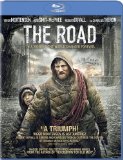| Reviews & Columns |
|
Reviews DVD TV on DVD Blu-ray 4K UHD International DVDs In Theaters Reviews by Studio Video Games Features Collector Series DVDs Easter Egg Database Interviews DVD Talk Radio Feature Articles Columns Anime Talk DVD Savant Horror DVDs The M.O.D. Squad Art House HD Talk Silent DVD
|
DVD Talk Forum |
|
|
| Resources |
|
DVD Price Search Customer Service #'s RCE Info Links |
|
Columns
|
|
|
Road, The
Sony Music // R // May 25, 2010
List Price: $34.95 [Buy now and save at Amazon]
The Film:
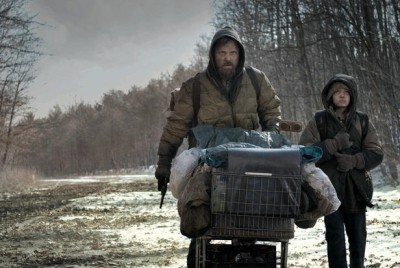 Getting acclimated to Cormac McCarthy's language in his Pulitzer Prize-winning novel "The Road" can be tough as he weaves through lengthy comma-free sentences and dialogue without quotations, but the raw clarity in which he paints his post-apocalyptic environment leaves very little to the imagination. He lightly scatters pensive ideas into his book, critiques on humanity's dog-eat-dog nature and the like, yet the real point in reading it comes in the nail-biting, breathless experience generated by a father and son trekking through gritty desolation. That roughness likely pulled The Proposition director John Hillcoat to the helm of this film adaptation like a magnet, a fitting match for the material due to his affinity with stark atmosphere. What he's created with The Road is a collage of all the memorable moments -- well, most of them anyway -- from McCarthy's work, drenching our journey through decaying America in disheartening beauty and feverish intent.
Getting acclimated to Cormac McCarthy's language in his Pulitzer Prize-winning novel "The Road" can be tough as he weaves through lengthy comma-free sentences and dialogue without quotations, but the raw clarity in which he paints his post-apocalyptic environment leaves very little to the imagination. He lightly scatters pensive ideas into his book, critiques on humanity's dog-eat-dog nature and the like, yet the real point in reading it comes in the nail-biting, breathless experience generated by a father and son trekking through gritty desolation. That roughness likely pulled The Proposition director John Hillcoat to the helm of this film adaptation like a magnet, a fitting match for the material due to his affinity with stark atmosphere. What he's created with The Road is a collage of all the memorable moments -- well, most of them anyway -- from McCarthy's work, drenching our journey through decaying America in disheartening beauty and feverish intent.
The narrative itself can be abridged in one sentence: a nameless father (Viggo Mortensen, The Lord of the Rings) and his son (Kodi Smit-McPhee), after losing the mother (Charlize Theron) amid a disaster that claimed the lives of most people on earth, set out on a journey of survival to the coast in search of food, habitable locations for sleep, and "good people". Since this story centers on the darker recesses of the situation, we experience little of the optimistic and a slurry of the depressing as the pair endure frigid cold and starvation -- all while scurrying from packs of nomadic cannibals that frequent the road. Inside of that, however, lies the story of a father teaching his son how to survive with the items he carries in his knapsack or rolling cart, teaching him how to "carry the fire" if he dies and whether suicide seems like a wise use of their two bullets.
Yes, The Road can be relentlessly gloomy, but Hillcoat's adaptation could've been more so. To pack McCarthy's story into a 110-minute film, a suitably brisk runtime for material of this magnitude, he's forced to limit the width of its visceral nature and concentrate on the moments that resonate. He retains key sequences from the book that are terrifying, such as one that entails discovering starving "victims", whom we assume have been captured for cannibalism, locked up in a dank basement, and another with The Man washing his son's hair of blood in a cold river following a violent incident. They're distressing to witness; conversely, though, Hillcoat and screenwriter Joe Penhall have also curbed the amount of the father's provocative and copious narration, veering away from the book's graphic descriptions of things like washing a dead man's brains from his son's hair. Similarly, the element of suspense generated in the book from nervously following the pair's fruitless scavenging for food, wondering if they'll actually eat or not, has been condensed into well-detailed but brusque snippets.
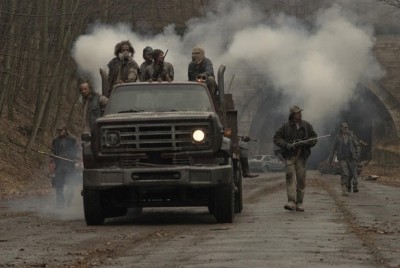 But, along with a grasp on the audience's pain threshold, this shows a fine quality of filmmaking that knows what lines to cross, and not, in projecting The Road on-screen. It's impossible to stave off enough of the narrative's mood to make it completely accessible, but John Hillcoat comes devastatingly close by striking a fine balance between reverence to McCarthy's intents and restricted intensity. He gets so many of the dreary images right, from the endless cart-rolling on the road and the heart-rending sight of their thinning bodies to the simple back-and-forth banter around frigid campfires, that it mirrors the impressions one might get after reading the novel -- not including the context breath-for-breath, but illustrating a nuanced eye for what's important. And, amid the ashen coldness, he lets in faint, end-of-the-world level brushes with warmth and hope. It requires our focus to point them out of the harshness, but they're rewarding nonetheless.
But, along with a grasp on the audience's pain threshold, this shows a fine quality of filmmaking that knows what lines to cross, and not, in projecting The Road on-screen. It's impossible to stave off enough of the narrative's mood to make it completely accessible, but John Hillcoat comes devastatingly close by striking a fine balance between reverence to McCarthy's intents and restricted intensity. He gets so many of the dreary images right, from the endless cart-rolling on the road and the heart-rending sight of their thinning bodies to the simple back-and-forth banter around frigid campfires, that it mirrors the impressions one might get after reading the novel -- not including the context breath-for-breath, but illustrating a nuanced eye for what's important. And, amid the ashen coldness, he lets in faint, end-of-the-world level brushes with warmth and hope. It requires our focus to point them out of the harshness, but they're rewarding nonetheless.
The prime ingredient to The Road's success comes in its visual construction of post-apocalyptic America, which Hillcoat gallantly pieced together with $25million in the expanses of Pennsylvania -- along with a few spots in Louisiana and Oregon. Capturing the earthy despondency in natural locations such as an abandoned turnpike and through Mount St. Helens, instead of entirely in the digital realm, builds a distinct realism that transplants us into a cold, downtrodden environment which speaks the same language as McCarthy's dark atmosphere. Cinematographer Javier Aguirresarobe, whose work ranges from Pedro Almodovar's tour de force Talk to Her (Hablo con ella) to the series of Twilight film adaptations, ensnares that ever-present gloom which never eases up, crafting austere beauty from barrenness and dilapidation. Scenes on the road itself are grimy and ruthless, while interior shots -- such as the ones when The Man visits his childhood home -- compassionately, and with fine dramatic detail, reflect on the unseen ghosts of times past.
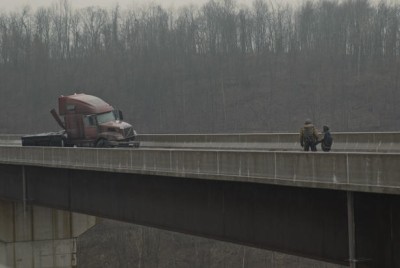 Visual manner is key, but it would be for naught without the right father-son chemistry -- which Viggo Mortensen and Kodi Smit-McPhee admirably pin down. Mortensen, naturally a bit on the gaunt side, grapples the slow decay of The Man by appearing stalwart for his son's well-being and browbeaten to equal measure. A lot of the emotional connect resides in his eyes, which are wide, somewhat wild, and frantic to a tempered level. Flashback sequences involving his wife, which are brought to life with better-than-expected aplomb from Charlize Theron, receive extended emotional focus here than the book and reminisce on their pre-catastrophe world in both tender and tumultuous lights. Kodi Smit-McPhee, somewhat differently, indicates a sense of both innocence and conditioning to the environment with his disposition that's impressive. The son's a boy who was born into sadness, without seeing birds or drinking Coca-Cola, and there's something about Smit-McPhee weathered but innocent attitude that intuitively conveys it.
Visual manner is key, but it would be for naught without the right father-son chemistry -- which Viggo Mortensen and Kodi Smit-McPhee admirably pin down. Mortensen, naturally a bit on the gaunt side, grapples the slow decay of The Man by appearing stalwart for his son's well-being and browbeaten to equal measure. A lot of the emotional connect resides in his eyes, which are wide, somewhat wild, and frantic to a tempered level. Flashback sequences involving his wife, which are brought to life with better-than-expected aplomb from Charlize Theron, receive extended emotional focus here than the book and reminisce on their pre-catastrophe world in both tender and tumultuous lights. Kodi Smit-McPhee, somewhat differently, indicates a sense of both innocence and conditioning to the environment with his disposition that's impressive. The son's a boy who was born into sadness, without seeing birds or drinking Coca-Cola, and there's something about Smit-McPhee weathered but innocent attitude that intuitively conveys it.
Still, none of that can sidestep the fact that John Hillcoat's The Road is still a tough, opaque film to watch, where humanity literally chews at itself amid society's rubble in the wake of disaster. What's accomplished here is that the much-labored imagery from the book, meticulously illustrated by McCarthy, has been condensed and articulated in visual form, a collage of affecting images spanning destroyed homes of hearth to the exasperating sight of a once-blue sea turned gray and sad. That's the experience in stepping into this picture, yet the way in which Hillcoat retains the core of the story -- the strengthening bond between The Man and his son as they struggle against the cruelties of both environment and humanity -- gives it hapless, famished emotion through every dismayed shot.
The Blu-ray:
Video and Audio:
In case you still weren't sure after the above film review, John Hillcoat's The Road is indeed a very dark picture with an equally bleak aesthetic -- though photographed with exceptional detail through stellar Arricam equipment. That makes Sony's 2.35:1 high-definition treatment of the film, rendered in an ample and proper AVC encode as one of their first paired distributions with The Weinstein Company, a little tricky to recommend based solely on visual pleasure. Aside from a few colorful flashback sequences, the film's draped in ashen browns and grays with little in the way of color interrupting the visuals, aside from a reddish-brown here and a grimy green there -- which, though they almost get lost against the rest of the palette, do shine through. Aside from that, just like the life gone from the human race, the color has been seeped away from the image much in the way of the book's descriptors.
However, it's in the detail and contrast support where The Road shines, presenting the granular detritus and mucky roadsides with well-attenuated focus. A few moments of crisp detail will surprise amid the drabness, such as the ash on a porch swing, fabric textures in the ever-changing layers of clothing on The Man and his son, rivets in a metal cover and the planks of wood against a house. Grain also pop up in backdrops to a slightly heavy but reassuring degree, while the plethora of black levels receive ravishing support from the disc's competence in contrast levels. This isn't, in any way, the type of film that'd be good for showcasing a display for its splendid HD image; however, it does properly render the film's moody palette with a handful of surprises, and that earns a very firm stamp of approval.
The DTS HD Master Audio track also carries strength and atmospheric potency alongside the visual treatment, but with a few caveats. Verbal clarity, at a handful of spots, can be a little difficult to hear over ambient sounds like rushing water at a "normal" listening level. However, once cranked up a few points higher than normal, the clarity issues vanished -- for the most part. Aside from some dialogue problems, the rest of the aural elements are spot-on and impressive; the light flickering of flames tickling the mid-range point, while the thunderous crashing of trees, the slams against wooden floors (from underneath), revving of the nomads' truck and the stronger billows of flames batter the lower-frequency channel on a semi-frequent basis. On a more delicate note, waves crashing against the shore and the searing sound of an arrow flying through the air are preserved with taut accuracy. Subtitles, which are only available in optional English and English SDH languages, appear within the very bottom of the image in very bright, clean text.
Special Features:
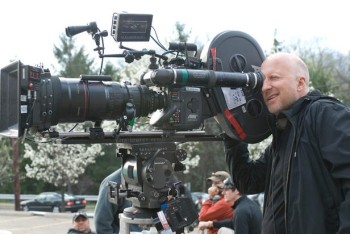 Commentary with Director John Hillcoat:
Commentary with Director John Hillcoat:
John Hillcoat might construct harsh and vivacious picture, but he's a subdued speaker -- and his commentary reflects that energy level, offering a track that's monotone yet modestly explorative. After you've gotten used to his rhythm of speaking, it's easy to get wrapped up in the content that he discusses. Topics fall on using a "blown-up" portion of Mount St. Helens for the scenes involving destroyed trees and the like, while also discussing how he struggled with casting the boy and how he considered going in Kubrick's direction in The Shining by not emphasizing the intensity of the sequences to the child.
He discusses how he wanted to avoid Mad Max references with the clothing, instead harking to Deliverance for inspiration regarding The Road nomads, while delving into the emotional fabric woven between Mortensen, Smit-McPhee, and the boy's real-life father during the cold river scene. Discussions also zero in on shooting several different versions of the Coca-Cola sequence in the film, since the brand was hesitant about being included in such a dark picture, and how they used an antique dealer's house for the cannibalism sequence. It's a downbeat but insightful track for the "inexperienced" commentary-giver Hillcoat.
Making of The Road (13:47, SD MPEG-2):
Taking a more standard look on the film, this collage of interviews and scant behind-the-scenes shots gives us a portrait of the emotional resonance that McCarthy's book had on all the filmmakers. After they talk about the book and McCarthy himself, the piece ratchets through all the actors and brightly discusses them. Some interesting bits do find their way into the piece, such as Theron wrecking her vocal chords during the birth sequence and how a light glimmer of improvisation from Robert DuVall led to one of the film's memorable moments.
On top of those two pieces, this Blu-ray Disc also comes with nearly seven minutes of Deleted Scenes (6:36, SD MPEG-2), including several well-presented portions from the book that would've been welcome additions (man struck by lightning, etc), as well as two Theatrical Trailers (2:32, 2:29; HD AVC). Furthermore, this disc has also been BD-Live and movieIQ activated for extra Internet activity.
Final Thoughts:
Cormac McCarthy's "The Road" is an endlessly gloomy tale of a father and son trekking through post-apocalyptic wilderness, told vividly within a splendidly-paced book. John Hillcoat has done fine justice to the source, capturing the hauntingly dense images, the connection between The Man and his boy, and the stream of gritty atmosphere concocted by McCarthy to an eloquent degree. Some of the suspense gets lost amid its steadfast desire to respect the book's aims, while the picture itself, though sturdy throughout its 110-minute drudge, is expectantly hard on both the nerves and emotions. But that's part of the experience in watching this particular slate of McCarthy's visuals come to life, and Hillcoat's picture echoes the desperation and darkness rather well.
Sony's release of The Road looks and sounds fittingly robust for the film's attitude, while carrying a handful of features that include a somber but informative commentary. Yes, the material's tough, but the thrilling composition of this dark environment and the sharp dramatic turns from Mortensen and Smit-McPhee boost the return value on this higher than expected. Highly Recommended.
Thomas Spurlin, Staff Reviewer -- DVDTalk Reviews | Personal Blog/Site
 Getting acclimated to Cormac McCarthy's language in his Pulitzer Prize-winning novel "The Road" can be tough as he weaves through lengthy comma-free sentences and dialogue without quotations, but the raw clarity in which he paints his post-apocalyptic environment leaves very little to the imagination. He lightly scatters pensive ideas into his book, critiques on humanity's dog-eat-dog nature and the like, yet the real point in reading it comes in the nail-biting, breathless experience generated by a father and son trekking through gritty desolation. That roughness likely pulled The Proposition director John Hillcoat to the helm of this film adaptation like a magnet, a fitting match for the material due to his affinity with stark atmosphere. What he's created with The Road is a collage of all the memorable moments -- well, most of them anyway -- from McCarthy's work, drenching our journey through decaying America in disheartening beauty and feverish intent.
Getting acclimated to Cormac McCarthy's language in his Pulitzer Prize-winning novel "The Road" can be tough as he weaves through lengthy comma-free sentences and dialogue without quotations, but the raw clarity in which he paints his post-apocalyptic environment leaves very little to the imagination. He lightly scatters pensive ideas into his book, critiques on humanity's dog-eat-dog nature and the like, yet the real point in reading it comes in the nail-biting, breathless experience generated by a father and son trekking through gritty desolation. That roughness likely pulled The Proposition director John Hillcoat to the helm of this film adaptation like a magnet, a fitting match for the material due to his affinity with stark atmosphere. What he's created with The Road is a collage of all the memorable moments -- well, most of them anyway -- from McCarthy's work, drenching our journey through decaying America in disheartening beauty and feverish intent. The narrative itself can be abridged in one sentence: a nameless father (Viggo Mortensen, The Lord of the Rings) and his son (Kodi Smit-McPhee), after losing the mother (Charlize Theron) amid a disaster that claimed the lives of most people on earth, set out on a journey of survival to the coast in search of food, habitable locations for sleep, and "good people". Since this story centers on the darker recesses of the situation, we experience little of the optimistic and a slurry of the depressing as the pair endure frigid cold and starvation -- all while scurrying from packs of nomadic cannibals that frequent the road. Inside of that, however, lies the story of a father teaching his son how to survive with the items he carries in his knapsack or rolling cart, teaching him how to "carry the fire" if he dies and whether suicide seems like a wise use of their two bullets.
Yes, The Road can be relentlessly gloomy, but Hillcoat's adaptation could've been more so. To pack McCarthy's story into a 110-minute film, a suitably brisk runtime for material of this magnitude, he's forced to limit the width of its visceral nature and concentrate on the moments that resonate. He retains key sequences from the book that are terrifying, such as one that entails discovering starving "victims", whom we assume have been captured for cannibalism, locked up in a dank basement, and another with The Man washing his son's hair of blood in a cold river following a violent incident. They're distressing to witness; conversely, though, Hillcoat and screenwriter Joe Penhall have also curbed the amount of the father's provocative and copious narration, veering away from the book's graphic descriptions of things like washing a dead man's brains from his son's hair. Similarly, the element of suspense generated in the book from nervously following the pair's fruitless scavenging for food, wondering if they'll actually eat or not, has been condensed into well-detailed but brusque snippets.
 But, along with a grasp on the audience's pain threshold, this shows a fine quality of filmmaking that knows what lines to cross, and not, in projecting The Road on-screen. It's impossible to stave off enough of the narrative's mood to make it completely accessible, but John Hillcoat comes devastatingly close by striking a fine balance between reverence to McCarthy's intents and restricted intensity. He gets so many of the dreary images right, from the endless cart-rolling on the road and the heart-rending sight of their thinning bodies to the simple back-and-forth banter around frigid campfires, that it mirrors the impressions one might get after reading the novel -- not including the context breath-for-breath, but illustrating a nuanced eye for what's important. And, amid the ashen coldness, he lets in faint, end-of-the-world level brushes with warmth and hope. It requires our focus to point them out of the harshness, but they're rewarding nonetheless.
But, along with a grasp on the audience's pain threshold, this shows a fine quality of filmmaking that knows what lines to cross, and not, in projecting The Road on-screen. It's impossible to stave off enough of the narrative's mood to make it completely accessible, but John Hillcoat comes devastatingly close by striking a fine balance between reverence to McCarthy's intents and restricted intensity. He gets so many of the dreary images right, from the endless cart-rolling on the road and the heart-rending sight of their thinning bodies to the simple back-and-forth banter around frigid campfires, that it mirrors the impressions one might get after reading the novel -- not including the context breath-for-breath, but illustrating a nuanced eye for what's important. And, amid the ashen coldness, he lets in faint, end-of-the-world level brushes with warmth and hope. It requires our focus to point them out of the harshness, but they're rewarding nonetheless. The prime ingredient to The Road's success comes in its visual construction of post-apocalyptic America, which Hillcoat gallantly pieced together with $25million in the expanses of Pennsylvania -- along with a few spots in Louisiana and Oregon. Capturing the earthy despondency in natural locations such as an abandoned turnpike and through Mount St. Helens, instead of entirely in the digital realm, builds a distinct realism that transplants us into a cold, downtrodden environment which speaks the same language as McCarthy's dark atmosphere. Cinematographer Javier Aguirresarobe, whose work ranges from Pedro Almodovar's tour de force Talk to Her (Hablo con ella) to the series of Twilight film adaptations, ensnares that ever-present gloom which never eases up, crafting austere beauty from barrenness and dilapidation. Scenes on the road itself are grimy and ruthless, while interior shots -- such as the ones when The Man visits his childhood home -- compassionately, and with fine dramatic detail, reflect on the unseen ghosts of times past.
 Visual manner is key, but it would be for naught without the right father-son chemistry -- which Viggo Mortensen and Kodi Smit-McPhee admirably pin down. Mortensen, naturally a bit on the gaunt side, grapples the slow decay of The Man by appearing stalwart for his son's well-being and browbeaten to equal measure. A lot of the emotional connect resides in his eyes, which are wide, somewhat wild, and frantic to a tempered level. Flashback sequences involving his wife, which are brought to life with better-than-expected aplomb from Charlize Theron, receive extended emotional focus here than the book and reminisce on their pre-catastrophe world in both tender and tumultuous lights. Kodi Smit-McPhee, somewhat differently, indicates a sense of both innocence and conditioning to the environment with his disposition that's impressive. The son's a boy who was born into sadness, without seeing birds or drinking Coca-Cola, and there's something about Smit-McPhee weathered but innocent attitude that intuitively conveys it.
Visual manner is key, but it would be for naught without the right father-son chemistry -- which Viggo Mortensen and Kodi Smit-McPhee admirably pin down. Mortensen, naturally a bit on the gaunt side, grapples the slow decay of The Man by appearing stalwart for his son's well-being and browbeaten to equal measure. A lot of the emotional connect resides in his eyes, which are wide, somewhat wild, and frantic to a tempered level. Flashback sequences involving his wife, which are brought to life with better-than-expected aplomb from Charlize Theron, receive extended emotional focus here than the book and reminisce on their pre-catastrophe world in both tender and tumultuous lights. Kodi Smit-McPhee, somewhat differently, indicates a sense of both innocence and conditioning to the environment with his disposition that's impressive. The son's a boy who was born into sadness, without seeing birds or drinking Coca-Cola, and there's something about Smit-McPhee weathered but innocent attitude that intuitively conveys it. Still, none of that can sidestep the fact that John Hillcoat's The Road is still a tough, opaque film to watch, where humanity literally chews at itself amid society's rubble in the wake of disaster. What's accomplished here is that the much-labored imagery from the book, meticulously illustrated by McCarthy, has been condensed and articulated in visual form, a collage of affecting images spanning destroyed homes of hearth to the exasperating sight of a once-blue sea turned gray and sad. That's the experience in stepping into this picture, yet the way in which Hillcoat retains the core of the story -- the strengthening bond between The Man and his son as they struggle against the cruelties of both environment and humanity -- gives it hapless, famished emotion through every dismayed shot.
The Blu-ray:
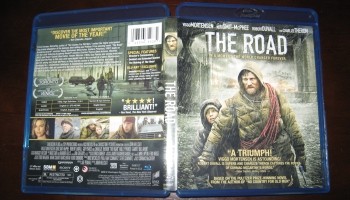 | 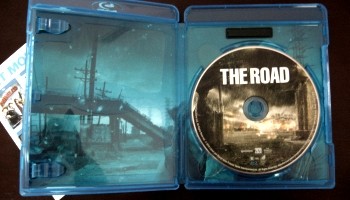 |
Video and Audio:
In case you still weren't sure after the above film review, John Hillcoat's The Road is indeed a very dark picture with an equally bleak aesthetic -- though photographed with exceptional detail through stellar Arricam equipment. That makes Sony's 2.35:1 high-definition treatment of the film, rendered in an ample and proper AVC encode as one of their first paired distributions with The Weinstein Company, a little tricky to recommend based solely on visual pleasure. Aside from a few colorful flashback sequences, the film's draped in ashen browns and grays with little in the way of color interrupting the visuals, aside from a reddish-brown here and a grimy green there -- which, though they almost get lost against the rest of the palette, do shine through. Aside from that, just like the life gone from the human race, the color has been seeped away from the image much in the way of the book's descriptors.
However, it's in the detail and contrast support where The Road shines, presenting the granular detritus and mucky roadsides with well-attenuated focus. A few moments of crisp detail will surprise amid the drabness, such as the ash on a porch swing, fabric textures in the ever-changing layers of clothing on The Man and his son, rivets in a metal cover and the planks of wood against a house. Grain also pop up in backdrops to a slightly heavy but reassuring degree, while the plethora of black levels receive ravishing support from the disc's competence in contrast levels. This isn't, in any way, the type of film that'd be good for showcasing a display for its splendid HD image; however, it does properly render the film's moody palette with a handful of surprises, and that earns a very firm stamp of approval.
The DTS HD Master Audio track also carries strength and atmospheric potency alongside the visual treatment, but with a few caveats. Verbal clarity, at a handful of spots, can be a little difficult to hear over ambient sounds like rushing water at a "normal" listening level. However, once cranked up a few points higher than normal, the clarity issues vanished -- for the most part. Aside from some dialogue problems, the rest of the aural elements are spot-on and impressive; the light flickering of flames tickling the mid-range point, while the thunderous crashing of trees, the slams against wooden floors (from underneath), revving of the nomads' truck and the stronger billows of flames batter the lower-frequency channel on a semi-frequent basis. On a more delicate note, waves crashing against the shore and the searing sound of an arrow flying through the air are preserved with taut accuracy. Subtitles, which are only available in optional English and English SDH languages, appear within the very bottom of the image in very bright, clean text.
Special Features:
 Commentary with Director John Hillcoat:
Commentary with Director John Hillcoat: John Hillcoat might construct harsh and vivacious picture, but he's a subdued speaker -- and his commentary reflects that energy level, offering a track that's monotone yet modestly explorative. After you've gotten used to his rhythm of speaking, it's easy to get wrapped up in the content that he discusses. Topics fall on using a "blown-up" portion of Mount St. Helens for the scenes involving destroyed trees and the like, while also discussing how he struggled with casting the boy and how he considered going in Kubrick's direction in The Shining by not emphasizing the intensity of the sequences to the child.
He discusses how he wanted to avoid Mad Max references with the clothing, instead harking to Deliverance for inspiration regarding The Road nomads, while delving into the emotional fabric woven between Mortensen, Smit-McPhee, and the boy's real-life father during the cold river scene. Discussions also zero in on shooting several different versions of the Coca-Cola sequence in the film, since the brand was hesitant about being included in such a dark picture, and how they used an antique dealer's house for the cannibalism sequence. It's a downbeat but insightful track for the "inexperienced" commentary-giver Hillcoat.
Making of The Road (13:47, SD MPEG-2):
Taking a more standard look on the film, this collage of interviews and scant behind-the-scenes shots gives us a portrait of the emotional resonance that McCarthy's book had on all the filmmakers. After they talk about the book and McCarthy himself, the piece ratchets through all the actors and brightly discusses them. Some interesting bits do find their way into the piece, such as Theron wrecking her vocal chords during the birth sequence and how a light glimmer of improvisation from Robert DuVall led to one of the film's memorable moments.
On top of those two pieces, this Blu-ray Disc also comes with nearly seven minutes of Deleted Scenes (6:36, SD MPEG-2), including several well-presented portions from the book that would've been welcome additions (man struck by lightning, etc), as well as two Theatrical Trailers (2:32, 2:29; HD AVC). Furthermore, this disc has also been BD-Live and movieIQ activated for extra Internet activity.
Final Thoughts:
Cormac McCarthy's "The Road" is an endlessly gloomy tale of a father and son trekking through post-apocalyptic wilderness, told vividly within a splendidly-paced book. John Hillcoat has done fine justice to the source, capturing the hauntingly dense images, the connection between The Man and his boy, and the stream of gritty atmosphere concocted by McCarthy to an eloquent degree. Some of the suspense gets lost amid its steadfast desire to respect the book's aims, while the picture itself, though sturdy throughout its 110-minute drudge, is expectantly hard on both the nerves and emotions. But that's part of the experience in watching this particular slate of McCarthy's visuals come to life, and Hillcoat's picture echoes the desperation and darkness rather well.
Sony's release of The Road looks and sounds fittingly robust for the film's attitude, while carrying a handful of features that include a somber but informative commentary. Yes, the material's tough, but the thrilling composition of this dark environment and the sharp dramatic turns from Mortensen and Smit-McPhee boost the return value on this higher than expected. Highly Recommended.
|
| Popular Reviews |
| Sponsored Links |
|
|
| Sponsored Links |
|
|
| Release List | Reviews | Shop | Newsletter | Forum | DVD Giveaways | Blu-Ray | Advertise |
|
Copyright 2024 DVDTalk.com All Rights Reserved. Legal Info, Privacy Policy, Terms of Use,
Manage Preferences,
Your Privacy Choices | |||||||









